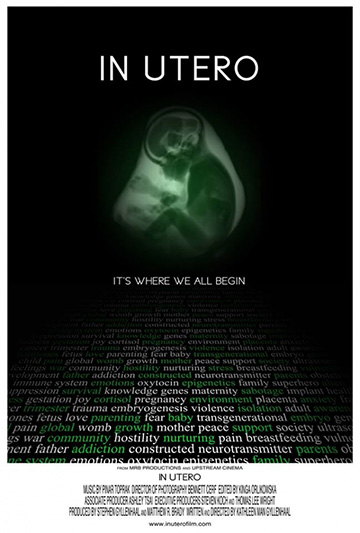IN UTERO: A film review, and visualization of the prenatal period
Pomegranate Baby, 30″ x 30′, oil on canvas
(Copyright 2013, Wenji Billow. All Rights Reserved)
During APPPAH’s (The Association for Prenatal and Perinatal Psychology and Health) recent international congress in Berkeley, I had the opportunity to attend an exclusive screening of the forthcoming documentary, IN UTERO. Written and directed by Kathleen Man Gyllenhaal, and produced by Stephen Gyllenhaal and Mathew R. Brady, IN UTERO is a groundbreaking film that brings attention to the prenatal period of human development. Traditionally, the significance of this period has been underestimated or completely ignored, but this film shows powerfully that the earliest stage of human development is intimately bound to the later physical, emotional, and psychological wellbeing of the person born.
Weaving together the research of authors and experts with specialties in areas such as pediatrics, psychiatry, psychology, social work, obstetrics and gynecology, midwifery, and psychoanalysis, IN UTERO unveils a fundamental fact that our global culture continues to ignore: the prenatal period is a critical time of development in the formation of a human being’s self. Stress to the fetus can have major implications in how that self grows. The evidence presented, which included MRI techniques showing the fetus under stress, is compelling and makes it clear that the prenatal period of life deserves our utmost attention as we endeavor to nurture the development of all human beings.
After the APPPAH showing, producer Stephen Gyllenhaal and some of the film’s experts, including APPPAH Co-Founder, Thomas Verny, M.D., and Ursula Volz-Boers, M.D., offered the audience a lively panel discussion, describing some of the research in more detail and answering audience questions. Controversial aspects of the film include its emphasis on the prenatal period as having such long-lasting effects on the formation of the self, as well as how the research could impact discussions of abortion and a woman’s reproductive rights.
As societies around the world grapple with problems ranging from the individual to the collective, from the achievement of personal well-being to the avoidance of war, violence, and strife, we must take into consideration the influence of the prenatal period in the formation of the selves that go on to act in the world. As the evidence of IN UTERO shows, nurturing unborn children, as well as their mothers and families during the prenatal period can have a positive impact on the broader ways in which society unfolds.
IN UTERO premiered at the 2015 Seattle International Film Festival where it was selected as one of 12 films to be in the documentary competition. See here for upcoming screenings and more information.

